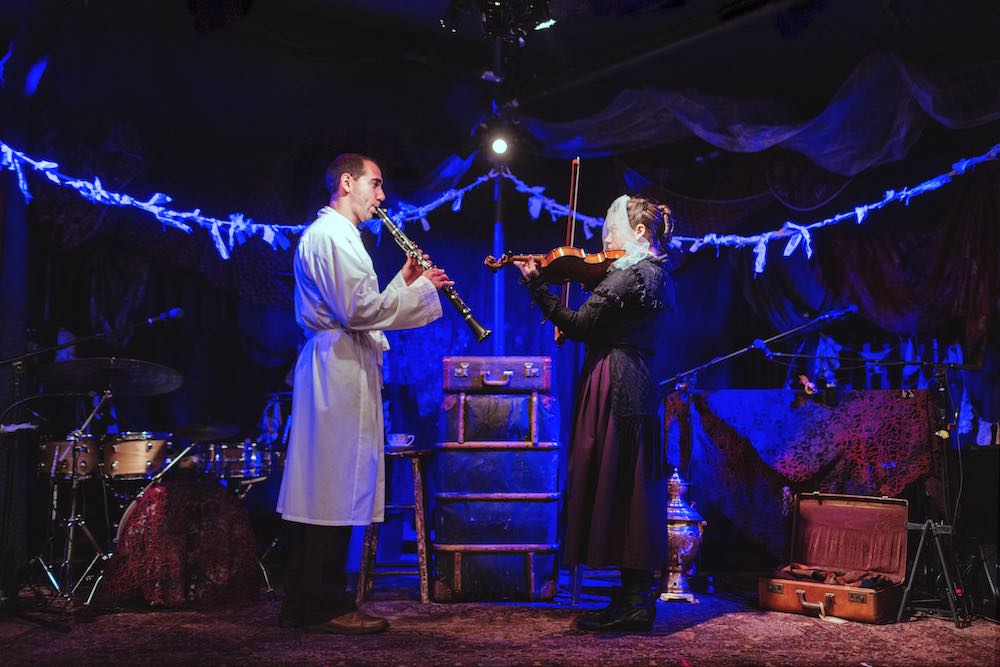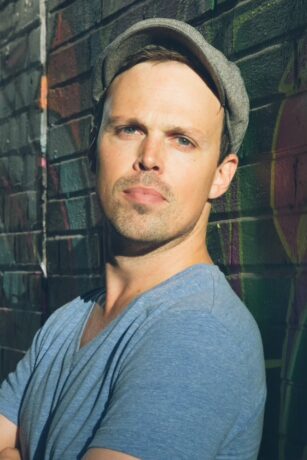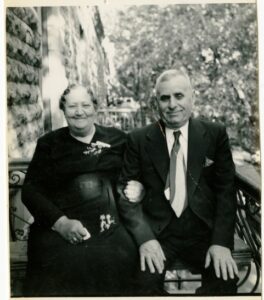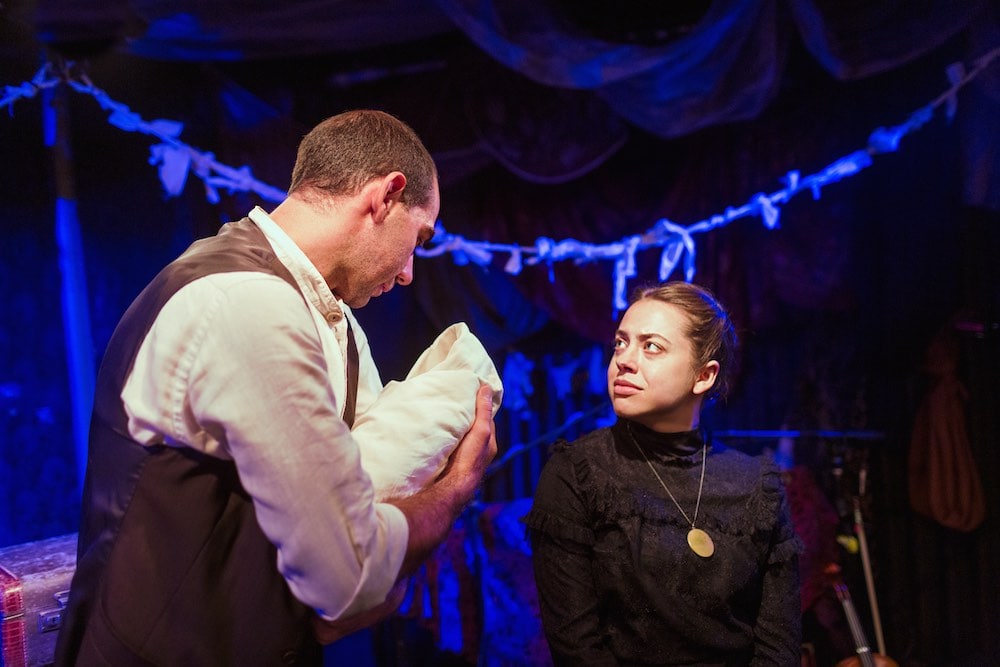When Old Stock: A Refugee Love Story opens at Theater J, the play will be celebrating its long-overdue DC debut, capping five years of international acclaim with a reminder that immigrants, of all colors and faiths, are still lining up on distant shores, hoping for a welcome that often isn’t there.
This production, which began in Canada, has now been staged in more than 30 cities on three continents and has racked up awards from New York to Edinburgh, Sidney, and beyond.
The show—which infuses cabaret-style shtick with the drama of escape—comes not a moment too soon, since it coincides with new waves of immigrants, arriving in busloads from Texas and coming from south of the border as well as Africa and the Middle East.

Most remarkable, the story Old Stock tells is set to the tune of Jewish wedding music, with five musicians playing a wealth of instruments—fiddle and flute, clarinet, accordion, and percussion—while the sixth, a bushy-haired narrator, pops in and out of packing crates, singing along.
How, I wondered, did a trio of Canadian writers—Christian Barry, the director of Old Stock and its co-author; his wife, the screenwriter and playwright Hannah Moscovitch; and Ben Caplan, the critically acclaimed folksinger and composer who is also the narrator—come up with this extraordinary piece of hybrid theater?

To find out, I called Christian Barry in Los Angeles, where he and seven-year-old Elijah Barry had joined Hannah, who was finishing work on a new episode for a TV series on AMC.
“So,” I began. “What’s a guy named Christian doing writing about Jewish refugees?”
“Impulse, for one thing, and protest, for another,” he laughed, explaining that he and Hannah had always wanted to work with Ben, whose band, Ben Caplan and the Casual Smokers, is, like their company, based in Halifax, Nova Scotia.
“Moreover,” he added, “Ben’s music is deeply influenced by his Jewish background. Since Hannah was pregnant at the time—meaning that I was about to become the father of a Jewish child—I wanted a Jewish connection to form a subtext to the play we were going to write.
“Ben was as excited as I was. We both saw this as an opportunity to write something more than a concert or revue. We wanted to create a serious musical drama.”
Both saw theater as a means of political expression. And both were horrified by the Syrian crisis, and particularly by the fact that the refugees fleeing the war were being measured in terms of quotas and cost, rather than as human beings who had nowhere else to go.
“And then we saw that terrible photo of the little boy—Alan Kurdi—who was found dead, washed up along the Turkish shore, trying, with his family, to escape the terrorism of Syria. And that was the genesis of our story.”
Hannah recognized the desperate flight to freedom as the same thing that had happened to her family when her great-grandparents met on the pier in Halifax in 1908. They were Jewish refugees from Eastern Europe, trying to get into Canada. Luckily, they were admitted. Others were not.
“We realized that 1908 was very similar to the world today. Islamophobia and antisemitism are the same,” Christian said.
“None is too many,” he quoted. Those words, spoken by a Canadian bureaucrat in Ottawa in 1906, referred to Jewish immigrants trying to get into the country. The line is incorporated into “You’ve Arrived,” the second song in Old Stock: A Refugee Love Story.
The title of the show, Old Stock, is taken from a remark made in 2015 by Steven Harper, prime minister of Canada, who tried to justify the refusal to admit immigrants from Syria by saying that “Old Stock Canadians” would not be willing to pay for the healthcare of these foreigners.
Of course, those “old stock” Canadians were all immigrants once.
“Who is really “old stock”? Christian asked rhetorically. “Only Indigenous people, the ones who were here before the Europeans arrived,” he replied.
“It’s the fear of those who look and sound different that’s the heart of the problem,” he added. And it continues to be relevant today, since it applies to everyone who is ‘different,’ regardless of whether they are from the Middle East, Africa, Latin America, or Asia.”
Although the three writers knew they wanted to write a musical play about the refugee crisis, they didn’t know what shape it would take.

It was at that point, after Elijah was born, that Hannah happened to visit Pier 21 in Halifax—the entry point for immigrants, much like ours at Ellis Island—and found the records of her great-grandparents, Chaim Moscovitch and Chaya, his wife-to-be. Both had fled the pogroms of Rumania. They arrived separately but met while waiting in line for interrogation.
When Hannah came home and told Christian about her discovery, he knew immediately that they had found the story in which to wrap the theme. “That’s it,” he said.
Ben Caplan agreed. The three quickly fleshed out a fictionalized version of the story, creating the songs and words that were loosely based on an amalgam of research and imagination. Ben and Christian wrote the music, while Hannah developed the theme and wrote the dialog.
“The three-way connection was truly organic,” Christian mused, calling it a totally collaborative effort. In fact, the three have hit it off so well that they plan to continue as a team.
The play that emerged from this partnership, Old Stock, has been described as both comic and raunchy. That’s not surprising, according to Christian, since Ben and Hannah are both adept at humor. “Comedy is a revitalizing element,” he said, pointing out that when dark tales, like this one, are invested with humor, laughter is the result.

As for the jokes about sex, “Judaism is rife with sexuality,” he said. After all, how many religions do you know of where the husband is commanded to satisfy his wife—and to do so with a frequency dictated by his occupation?” (Hint: camel drivers have fewer obligations than stay-at-home scholars or shopkeepers.)
The show also has a lot of profanity, but—from Christian’s point of view—that’s not shocking. “It reminds us that this is not a play about history; it’s about today. It depicts a world in which the F-word is just an ordinary part of speech,” he explained.
Old Stock had its world premiere in Halifax in 2017. It opened, appropriately enough, at 2b Theatre Company, an incubator of world-renowned drama founded 22 years ago by Christian with Anthony Black, a fellow director and producer who has since stepped aside. The theater is named for Hamlet’s “To be, or not…”
Although Old Stock was on hiatus during the pandemic, it is now back on tour, with plans to run for as long as immigration remains an issue, and until refugees—like three-year-old Alan Kurdi—are no longer turned away.
Running Time: 85 minutes, with no intermission.
Old Stock: A Refugee Love Story plays September 7 through 25, 2022, presented by Theater J performing at the Aaron & Cecile Goldman Theater in the Edlavitch DC Jewish Community Center, 1529 16th Street NW, Washington, DC. Purchase in-person tickets ($39–$84) online or by calling the ticket office at 202-777-3210.
COVID Safety: In accordance with the Edlavitch DCJCC policy, all individuals will be required to show proof of full vaccination each time they enter the EDCJCC by presenting either digital documentation on a smartphone or a physical copy of their vaccination card. Individuals with medical or religious exemptions to vaccinations will be required to show proof of a negative COVID-19 PCR test taken within 72 hours of their arrival at the EDCJCC. All patrons in the Goldman Theater will be required to wear masks. Only performers and guests invited onstage may be unmasked. Masks are optional but encouraged in the Q Street and 16th Street lobbies, hallways, and other public spaces. Theater J front-of-house staff and volunteers will continue to wear masks. For more information, visit Theater J’s COVID Safety Guidelines.
SPECIAL EVENT: Local Perspectives on the Global Refugee Crisis
Monday, September 12, 2022, at 7 pm Tickets: $5 (register here)
Like Chaim and Chaya in Old Stock, more than 100 million people are now refugees, driven out of their homes and desperately seeking refuge in other lands. Find out more about the enormity of the problem, and some of the possible solutions, by attending this panel discussion at the EDCJCC.
Old Stock: A Refugee Love Story – Forward 150 from 2b theatre company on Vimeo.
SEE ALSO:
‘Old Stock’ at Theater J tells two refugees’ deeply affecting love story (review by Bob Ashby)
Theater J announces season of provocative drama and abundant joy




